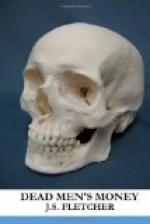So here was Sir Gilbert Carstairs, seventh baronet, before me, chatting away to some of the other gentlemen of the neighbourhood, and there was not a doubt in my mind that he was the man whom I had seen on the road the night of the murder. I was close enough to him now to look more particularly at his hand, and I saw that the two first fingers had completely disappeared, and that the rest of it was no more than a claw. It was not likely there could be two men in our neighbourhood thus disfigured. Moreover, the general build of the man, the tweed suit of grey that he was wearing, the attitude in which he stood, all convinced me that this was the person I had seen at the cross-roads, holding his electric torch to the face of his map. And I made up my mind there and then to say nothing in my evidence about that meeting, for I had no reason to connect such a great gentleman as Sir Gilbert Carstairs with the murder, and it seemed to me that his presence at those cross-roads was easily enough explained. He was a big, athletic man and was likely fond of a walk, and had been taking one that evening, and, not as yet being over-familiar with the neighbourhood—having lived so long away from it,—had got somewhat out of his way in returning home. No, I would say nothing. I had been brought up to have a firm belief in the old proverb which tells you that the least said is soonest mended. We were all packed pretty tightly in the big room of the inn when the coroner opened his inquiry. And at the very onset of the proceedings he made a remark which was expected by all of us that knew how these things are done and are likely to go. We could not do much that day; there would have to be an adjournment, after taking what he might call the surface evidence. He understood, he remarked, with a significant glance at the police officials and at one or two solicitors that were there, that there was some extraordinary mystery at the back of this matter, and that a good many things would have to be brought to light before the jury could get even an idea as to who it was that had killed the man whose body had been found, and as to the reason for his murder. And all they could do that day, he went on, was to hear such evidence—not much—as had already been collected, and then to adjourn.
Mr. Lindsey had said to me as we drove along to the inn that I should find myself the principal witness, and that Gilverthwaite would come into the matter more prominently than anybody fancied. And this, of course, was soon made evident. What there was to tell of the dead man, up to that time, was little. There was the medical evidence that he had been stabbed to death by a blow from a very formidable knife or dagger, which had been driven into his heart from behind. There was the evidence which Chisholm and I had collected in Peebles and at Cornhill station, and at the inn across the Coldstream Bridge. There was the telegram which had been sent by Mr. Gavin Smeaton—whoever he might be—from




